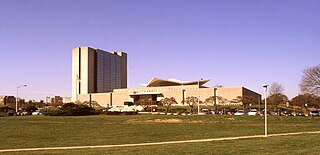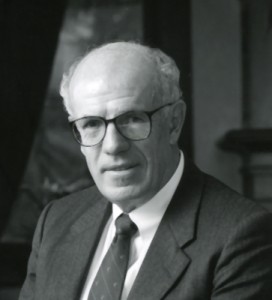
Health informatics is the study and implementation of computer structures and algorithms to improve communication, understanding, and management of medical information. It can be view as branch of engineering and applied science.

The United States National Library of Medicine (NLM), operated by the United States federal government, is the world's largest medical library.
MedlinePlus is an online information service produced by the United States National Library of Medicine. The service provides curated consumer health information in English and Spanish with select content in additional languages. The site brings together information from the National Library of Medicine (NLM), the National Institutes of Health (NIH), other U.S. government agencies, and health-related organizations. There is also a site optimized for display on mobile devices, in both English and Spanish. In 2015, about 400 million people from around the world used MedlinePlus. The service is funded by the NLM and is free to users.

The Medical Library Association (MLA) is a nonprofit educational organization with more than 3,400 health-sciences information professional members.

A health or medical library is designed to assist physicians, health professionals, students, patients, consumers, medical researchers, and information specialists in finding health and scientific information to improve, update, assess, or evaluate health care. Medical libraries are typically found in hospitals, medical schools, private industry, and in medical or health associations. A typical health or medical library has access to MEDLINE, a range of electronic resources, print and digital journal collections, and print reference books. The influence of open access (OA) and free searching via Google and PubMed has a major impact on the way medical libraries operate.
Index Medicus (IM) is a curated subset of MEDLINE, which is a bibliographic database of life science and biomedical science information, principally scientific journal articles. From 1879 to 2004, Index Medicus was a comprehensive bibliographic index of such articles in the form of a print index or its onscreen equivalent. Medical history experts have said of Index Medicus that it is “America's greatest contribution to medical knowledge.”
Edward ("Ted") Hance Shortliffe is a Canadian-born American biomedical informatician, physician, and computer scientist. Shortliffe is a pioneer in the use of artificial intelligence in medicine. He was the principal developer of the clinical expert system MYCIN, one of the first rule-based artificial intelligence expert systems, which obtained clinical data interactively from a physician user and was used to diagnose and recommend treatment for severe infections. While never used in practice, its performance was shown to be comparable to and sometimes more accurate than that of Stanford infectious disease faculty. This spurred the development of a wide range of activity in the development of rule-based expert systems, knowledge representation, belief nets and other areas, and its design greatly influenced the subsequent development of computing in medicine.
The National electronic Library for Health (NeLH) was a digital library service provided by the NHS for healthcare professionals and the public between 1998 and 2006. It briefly became the National Library for Health and elements of it continue to this day as NHS Evidence, managed by the National Institute for Health and Care Excellence, and a range of services provided by Health Education England's Library and Knowledge Service Leads.

Homer Richards Warner was an American cardiologist who was an early proponent of medical informatics who pioneered many aspects of computer applications to medicine. Author of the book, Computer-Assisted Medical Decision-Making, published in 1979, he served as CIO for the University of Utah Health Sciences Center, as president of the American College of Medical Informatics, and was actively involved with the National Institutes of Health. He was first chair of the Department of Medical Informatics at the University of Utah School of Medicine, the first American medical program to formally offer a degree in medical informatics.

The University of Central Florida College of Medicine is an academic college of the University of Central Florida located in Orlando, Florida, United States. The VP of Health Affairs and dean of the college is Deborah C. German, M.D.
The American Medical Informatics Association (AMIA), is an American non-profit organization dedicated to the development and application of biomedical and health informatics in the support of patient care, teaching, research, and health care administration.
E-Science librarianship refers to a role for librarians in e-Science.
Translational bioinformatics (TBI) is a field that emerged in the 2010s to study health informatics, focused on the convergence of molecular bioinformatics, biostatistics, statistical genetics and clinical informatics. Its focus is on applying informatics methodology to the increasing amount of biomedical and genomic data to formulate knowledge and medical tools, which can be utilized by scientists, clinicians, and patients. Furthermore, it involves applying biomedical research to improve human health through the use of computer-based information system. TBI employs data mining and analyzing biomedical informatics in order to generate clinical knowledge for application. Clinical knowledge includes finding similarities in patient populations, interpreting biological information to suggest therapy treatments and predict health outcomes.
Primary spine practitioners are health care professionals who are specially trained to provide primary care for patients with spinal disease.

StatsDirect is a statistical software package designed for biomedical, public health, and general health science uses. The second generation of the software was reviewed in general medical and public health journals.

Drummond Rennie is an American nephrologist and high altitude physiologist who is a contributing deputy editor of The Journal of the American Medical Association (JAMA) and an adjunct professor of medicine at the University of California, San Francisco.
The International Society for Infectious Diseases (ISID), established in 1986, is a nonprofit organization that monitors infectious diseases on a global scale. It also offers grants and fellowships, publishes a journal, and runs online learning platforms for sharing information on managing infectious diseases. It is based in Brookline, Massachusetts, US. The organization solicits donations from the general public, as well as governments, foundations, and the pharmaceutical industry.
BMJ Best Practice is an online decision-support tool for use at the point of care. It was created in 2009 by The BMJ.

Estelle Brodman (1914–2007) was an American medical librarian and medical historian. She held positions at Columbia University, the National Library of Medicine and the Washington University School of Medicine (WUSM). Brodman served terms as director of the Special Libraries Association, president of the Medical Library Association, and editor of the Bulletin of the Medical Library Association. Under Brodman's leadership, the library at WUSM became known as a leader in the use of computing machines to perform library functions.
Lucretia W. McClure was an American medical librarian. She was most recently volunteering for the archives within the Edward G. Miner library, University of Rochester Medical Center. She previously was a director there, and after her retirement in 1993, she worked at Boston Medical Library from 1994 to 2011. Besides her service to those institutions, McClure served for decades within the Medical Library Association, including a stint as President (1990-91). She is the only person to have been interviewed twice for the MLA Oral History Project, first in 1998 and again in 2015.








